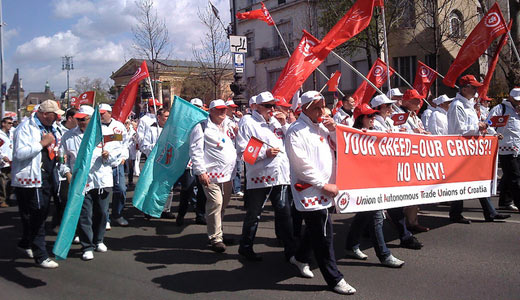
(Originally published in People’s World)
Economist Paul Krugman, in his new book – End the Depression Now! – and recent opinion columns in the New York Times, expresses exasperation with sections of the political and economic elite on both sides of the Atlantic over their stewardship of the economy.
Krugman says too many people at or near the levers of power are choosing austerity policies that could well send the world into a far deeper economic quagmire.
What drives him nearly crazy is that other choices exist and could easily be pursued if the will were there on the part of highly placed decision-makers. Such choices include accenting government spending, allowing for modest inflation, and economic growth. These would, says Krugman, lift the global economy out of the doldrums, including bringing the unemployment rate down from its current depression levels.
But to his consternation, the language and practice of austerity drowns out the voices of reason and economic revival both here and in Europe.
So the question is: What explains this seemingly irrational attachment to policies that leave the U.S. and Europe in stagnation and could well throw both (and the world for that matter) into a deep depression?
The answer has three parts, all interrelated.
First of all, proponents of austerity in high places ( the most zealous are on the political right – Merkel in Germany, Cameron in the UK, and the Republicans in the U.S. Congress) are tethered to an erroneous economic argument. That is, that belt-tightening is necessary for economic expansion because it boosts investor confidence, tamps down inflationary pressures, and prevents evil public capital from crowding out sacred private capital in the marketplace.
But this argument has been ably refuted on numerous occasions by Krugman and many others. And it has proved terribly wanting in countries where it has been the practice.
Second, behind every policymaker espousing austerity is not some defunct economist as John Maynard Keynes once suggested, but powerful corporate class interests, and especially finance capital.
For these interests, a protracted economic downturn, as we are now experiencing, is an opportunity as well as a crisis. On both sides of the Atlantic, it is a singular moment for big capital to radically rearrange to its advantage the economic and power relations that have been embedded in advanced capitalism for more than a half century.
We make a mistake if we think that the top tier of monopoly capital is committed to a robust recovery that would lift all boats, to the reproduction of capitalism on an expanded scale. That fiction is best left in introductory economic textbooks.
A capitalist economy oscillating around a low level of economic activity not only is capable of generating profits, but can also strengthen the bargaining hand of capital against labor and the popular movement. Indeed, a world economy characterized by overcapacity, stagnation, and intensified competition, provides optimal conditions for rolling back the political and collective bargaining rights and benefits won in an earlier period of capitalist development.
Finally, capitalism, we should not forget, is an irrational system. Its commitment to the structural logic of capital accumulation and profit maximization makes it so. This has always been the case, but it takes on even greater force in this era of structural crisis and environmental destruction on a global level. No matter where we turn, it seems like capitalism is aggressively pursuing polices that make no sense from the standpoint of humanity, economic sanity, and nature.
Capitalism needs to be replaced.
Photo: “Your greed = our crisis? No way!” Banner held by Croatian union members in a European trade union demonstration on the theme “No to austerity – For social Europe, for fair pay and for jobs,” April 9, 2011, in Budapest. HatM CC 2.10


 Join Now
Join Now